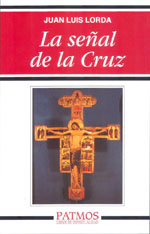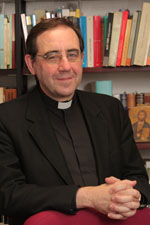Juan Luis Lorda, teólogo de la Universidad de Navarra, publica “La señal de la cruz”, meditación poética sobre el Via Crucis
Juan Luis Lorda, theologian at the University of Navarra, publishes "The Sign of the Cross", a poetic meditation on the Stations of the Cross.
This new edition adds a collection of sonnets and a rhymed translation of classic Eucharistic hymns.

Juan Luis Lorda, professor of the School of Theology at the University of Navarra, has renewed his book The Sign of the Cross, with a collection of sonnets on the Passion of Christ and the rhymed translation of some classic Eucharistic hymns, such as 'Adoro te devote'. "The Sign of the Cross," he says, "is conceived as a book of meditation. With brief and lively considerations, it involves the reader in the mystery of the passion, death and resurrection of Christ".
"It is an attempt to delve into the surprising paradox of the Lord's Cross, where we are given the keys to discover the depth of divine love, the gravity of sin and the meaning of human suffering," explains the author in the prologue.
Professor Lorda points out that the new sonnets "maintain this intimate and poetic tone and go through the scenes of the Passion up to the joy of the Resurrection. It is a timely companion for the Lenten season and the preparation of Holy Week".
The author
 |
| Juan Luis Lorda. |
| Photo: Manuel Castells |
Juan Luis Lorda is an Industrial Engineer and holds a PhD in Theology from the University of Navarra. In the campus of Pamplona he teaches the teaching as professor of the School of Theology, the School Ecclesiastical Philosophy and the high school of Anthropology and Ethics. He is also a member of the group of research "Ciencia, Razón y Fe" and of the committee advisor of catechesis of the Spanish Episcopal lecture , and partner in religious media, cultural magazines and in the daily press. He is the author of several theological and humanistic manuals and essays, such as Antropología Teológica; Para una idea cristiana del hombre; Antropología cristiana; Para ser cristiano; Moral, el arte de vivir; Humanismo, Los bienes invisibles; and Humanismo II, tareas del espíritu.
